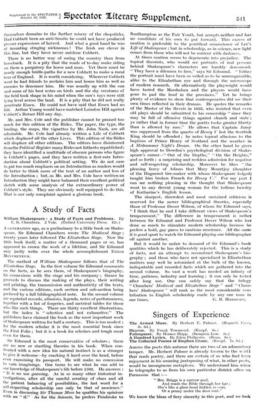A Study of Facts
A GENERATION ago, as a preliminary to a little book on Shake- speare, Sir Edmund. Chambers wrote The _Medieval Stage ; twenty years later followed The Elizabethan Stage. Now the little book itself, a matter of a thousand pages or so, has appeared to crown the work of a lifetime, and Sir Edmund may justly write over the whole accomplishment EXEGI MONTMENTVM.
The method of William Shakespeare follows that of The Elizabethan Stage. In the first volume Sir Edmund comments on the facts, as he sees them, of Shakespeare's biography, his connexions with the stage and his company ; thence he proceeds to discuss the making of the plays, their writing and printing, the transmission and authenticity of the texts, and the various editions, each section and sub-section being prefaced by a full bibliographical note. In the second volume are reprinted records, allusions, legends, notes of performances, together with a list of forgeries, and metrical tables for those who like suelithings. There are thirty excellent illustrations, but the index is " selective and not exhaustive." The publishers have claimed the book as the most important work of Shakespeare written for half a century. This is too modest ; for the modem scholar it is the most essential book since the First Folio ; but it is a book for scholars and tough meat even for them.
Sir Edmund is the most conservative of scholars ; there are no new or startling theories in his book. When con- fronted with a new idea his natural instinct is as a stranger to give it welcome—by cracking it hard over the head, before even examining its passport. He will make, no concession to vain imaginings. One turns to see what he can add to our knowledge of Shakespeare's life before 1592. He answers : " It is no use guessing. As in so many other historical in- vestigations, after all the careful scrutiny of clues and all the patient balancing of possibilities, the last word for a brit.- respecting scholarship can only be that of nescience." Even in discussing Sir Thomas More he qualifies his opinions' with an "L" As :for the iSnitnets, he prefers Pembroke to
Southampton as the Fair Youth, but accepts neither and has no candidate of his own to put forward. This excess of caution is preferable to the pontifical omniscience of Lee's Life of Shakespeare ; but in scholarship, as in science, new light Comes from those who will not be content with darkness.
At times caution seems to degenerate into prejudice. The topical theorists, who would see portraits of real persons behind Shakespeare's characters are harshly denounced. " They have a dilemma to face," says Sir Edmund. " Either the portrait must have been so veiled as to be unrecognizable, alike to the Elizabethan eye and through the microscope of modern research. Or alternatively the playwright would have tasted the Marshalsea and the players would have gone to pad the hoof in the provinces." Yet he brings plenty of evidence to show that contemporaries did see their own times reflected in their dramas. He quotes the remarks of the Master of the Revels in 1638, who insisted that even old plays should be submitted to his censorship " since they may be full of offensive things against church and state ; ye rather that in former time the poetts tooke greater liberty than is allowed by nice." He allows that Captain Janiy was suppressed from the quarto of Henry V lest the Scottish King should be offended ; he notes topical allusions to the baptism of Prince Henry of Scotland and the weather in A Midsummer Night's Dream. On the other hand he gives high approval to Dowden's psychological division of Shake- speare's career—" Out of the Depths," " On the Heights," and so forth ; a surprising and reckless admission for negative and self-respecting scholarship. Moreover he likes " the pleasing fancy of Adams that Mary Mountjoy (daughter of the Huguenot tire-maker with whom Shakespeare lodged) taught him broken French for Henry F." For my part I can see nothing pleasing in the thought that Shakespeare went to any decent young woman for the tedious bawdry of Katharine's English lesson.
The sharpest, shrewdest and most sustained criticism is reserved for the newer bibliographical theories, especially those of Professor Dover Wilson, of whom Sir Edmund says, " I think that he and I take different views of Shakespeare's temperament." The difference in temperament is rathc between Sir Edmund and Professor Dover Wilson who has done so much to stimulate modem scholarship because ho prefers a bold, gay guess to cautious ncscience. All the sante it is good sport to watch Sir Edmund playing one bibliographer off against another.
But it would be unfair to demand of Sir Edmund's book qualities which he has deliberately rejected. This is a study of facts, not an attempt to reconstruct Shakespeare's bio- graphy ; and those who have not specialized in Elizabethan matters may well be astonished at the bulk of the known, indisputable and recorded facts which are gathered into the second volume. So vast a work has needed an infinity of time, patience, industry and learning ; it can only be tested after long use. One can safely say that the trilogy " Chambers' Medieval and Elizabethan Stage" and " Cham- bers' Shakespeare" will rank as the most considerable con- tribution to English scholarship made by any one man in
























































 Previous page
Previous page